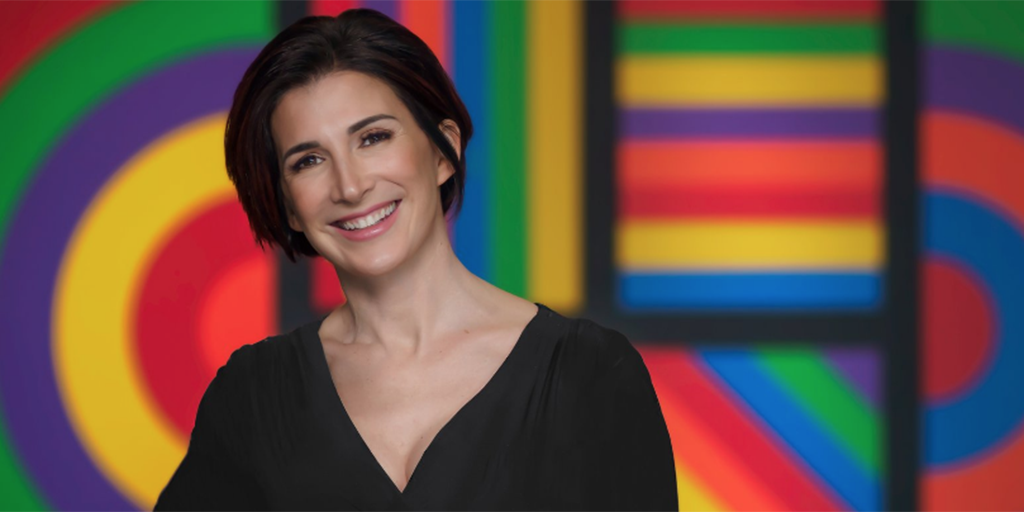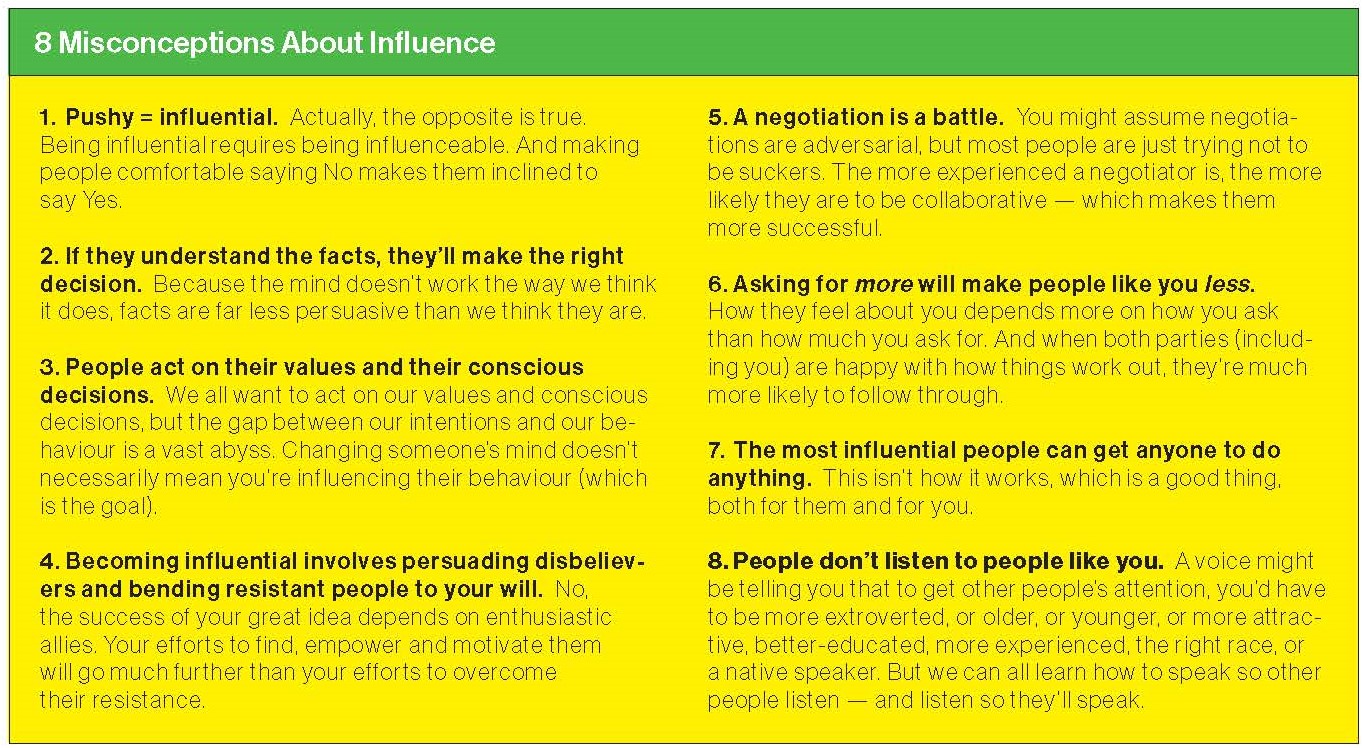
How do you define a ‘person of influence’ in today’s world?
Whether we realize it or not, we are influencing people all the time, from the time we are very young. Whenever you do or say something that effects a change in someone else’s thinking or behaviour, you are being influential. And we learn pretty early on that influence is power. If you ask people if they’d like to be more influential, most will say yes. That’s not surprising, because being influential gives us the ability to create change, direct resources and move hearts and minds. As our paths cross, entwine, diverge and reconnect, we form a greater whole, a sprawling ‘living web’ of influence.
Talk a bit about the darker side of influence.
The concept of influence has been corrupted by tacky, greedy people using sneaky tactics to sell used cars, promote products and get us to ‘buy now, while supplies last!’ But influence is a bit like electricity in the sense that it’s not good or bad per se; it depends on how you use it. You could use it to turn on the lights in a school or you could use it to power an electric chair.
There are two main types of influence: transactional and interpersonal — and it’s the transactional strategies and tactics that are often described as manipulative. Even influence gurus like Robert Cialdini refer to customers as ‘targets’ and encourage marketers to use ‘weapons of influence’ on them. This approach treats people like objects: you’re just trying to get something out of the other party or make a deal. These tactics might be standard for sales and marketing, but they won’t work with your colleagues, friends or family. Getting these people to say Yes to us requires interpersonal influence. It’s no coincidence that jobs relying on this type of influence are well compensated. Top salespeople often make more than their CEOs, and many lobbyists earn more than the politicians they influence.
If you want people to do more business with you,
make it as easy as possible.
You use an interesting analogy to describe our thinking systems. Please share it.
The Gator is my analogy for the unconscious system that governs the vast majority of our decisions and behaviour. It is quick, intuitive and emotional, and uses lots of mental shortcuts. As a result, it’s biased in all kinds of ways and is often inefficient. Imagine an alligator lurking just below the surface of your conscious awareness, constantly scanning for opportunities and threats. Like a gator, this part of our cognition is so lazy that it ignores almost everything around it unless it is a significant threat or an easy opportunity. The Judge is my analogy for our conscious decision-making system. A judge can only deliberate on one case at a time and carefully weighs all the evidence. This takes more time and effort, so we try to avoid this type of thinking. Unfortunately, it only explains a tiny fraction of our behaviour.
Many readers will recognize that this sounds like Daniel Kahneman and Amos Tversky’s System 1 and System 2 thinking — and it is. These are just my names for these systems. I’ve been teaching Behavourial Economics for a while now, and I’ve found that people easily confuse the System 1 and 2 terminology. But if they picture a Gator and a Judge, that helps.
On both the transactional and interpersonal influence fronts, you believe ease is the single best predictor of behaviour. Please explain.
Research indicates that 95 per cent of our decisions are made in Gator mode, and that’s why ease is always better than motivation, price or quality. There’s a little-known marketing metric for measuring ease called the Customer Effort Score, and it comes down to a simple question: How easy was it? How customers answer that one question explains one-third of their willingness to buy again, to increase their business with your company or to rave about it to other people. That may not sound like much, but it’s actually huge; the Customer Effort Score is 12 per cent more predictive of customer loyalty than customer satisfaction is. Ease makes people happy, and effort can really frustrate them.
Think about it: You probably shop on Amazon more often than you go to Target, because it’s easy to find what you want, get it quickly and return it if it doesn’t work out. You probably use a ride-sharing app instead of calling a taxi because it’s easier to not have to search for a phone number or dig through your purse for your wallet. If you want people to do more business with you, make it as easy as possible.
In the realm of interpersonal influence, what are ‘diminishers,’ and why do we use them?
We use diminishers in an effort to be likable. We don’t want to be seen as threatening or thought to be arrogant. One diminisher is using an abundance of first-person pronouns, like ‘I.’ We tend to use these in situations where we’re hedging. We’ll say things like, ‘I was just wondering…,’ ‘I thought maybe…’ or ‘I could be wrong, but...’ The remedy for these diminishers is simple: Just say what you’re trying to say! Instead of starting out with, ‘I could be wrong, but…’ try saying, ‘How about if you try this?’ Questions are a great way to get rid of diminishers. And people appreciate it when we just say what we want.
A large part of being influential is having people pay attention to you, which involves being charismatic. And, being charismatic actually entails focusing your attention on other people rather than on yourself. Diminishers are clues we need to watch out for, because they indicate we’re focusing too much attention on ourselves, and therefore we aren’t optimizing our influence.
You have found that one of the fastest ways to gain interpersonal influence is to say No more often. Why is that?
People of influence realize that they can say No without rejecting the other party. Research shows that almost of all of us — 90 per cent — are people pleasers. Our default reaction is to say Yes all the time. But when we practice saying No more often, we get some of our time back to focus on what is truly important to us. You don’t have to passively let all of your time get swept away by anyone who can find a spot on your calendar! When we say No, we are drawing boundaries around our comfort zone.
This is actually the first challenge I assign in my MBA course: for 24 hours, my students have to say No to every single person who asks them for something. Whether it’s big or small, personal, professional, something they want to do or don’t want to do. I want them to get that practice and experience how it feels to say No. How do people react? And what things do you really want to say Yes to? You have to start with No to expand both your comfort zone and your power.

Describe how ‘framing’ can be used to gain influence.
Framing is the idea that the words and terms you use to describe something have an almost magical effect on the world. Careful framing of messages is actually my top tip for visionary leadership. When you look at almost every visionary leader in history, framing has been one of their most powerful tools. An example related to current events is the way people have described what is going on between Russia and Ukraine. Early on, the dominant frame in the media was to call it a ‘conflict.’ However, a conflict is something that takes place between two parties, and you can just sit back and watch. It’s something that your parents might have or you might have with your partner. It’s not a big deal. Using the term ‘war’ creates a very different frame, and this has since become the dominant one. Obviously, a war is something big and important that might be relevant for people in other countries and have serious implications for them.
You have said that if a person is both kind and smart, they have a liability that keeps them from being as influential as they could be. Please explain.
Kind people tend to be overly cautious about manipulating people. They never want anyone to feel pressured or uncomfortable, and as a result, they step back from all kinds of strategies or techniques they could be using to be more influential. And smart people often have the misconception that the best way to influence someone to make a particular choice — especially if they, too, are smart — is to provide them with facts, analysis and data. But that’s not how influence works. When we do these things we risk leaving the world in the hands of power-hungry people who study and practice influence.
Talk a bit about the red flags we should look out for to ensure that we’re not being influenced in a negative way.
As indicated earlier, the main setting where people will try to manipulate you is in transactional situations, and the number one strategy they use is urgency. Any time you feel rushed or like someone is trying to force your decision, that is a sign that they don’t really care about your well-being. They’re just trying to get what they want. And when we feel rushed, we go into Gator mode and often take the ‘bait.’ A second sign of manipulation is that you are feeling intense emotions. It could be excitement, outrage, fear or spiritual elevation. When you feel any intense emotion, you go into Gator territory and don’t think clearly. Another red flag is related to exclusivity. Any time we are presented with an opportunity to be part of some exclusive VIP group, it’s very difficult to say No. Those are some common red flags.
Why should we all care about being influential?
Interpersonal influence is what has allowed our species to band together and work together to achieve amazing things. And it will remain our advantage in an increasingly digital world, for as long as people are in charge. It has given you the success you already have, and it is the path to what you still hope to do. In the end, influence doesn’t flow to those who deserve it, but to those who understand it and practice it. By shifting from transactional, win-lose influence to personal, mutual influence, you can become a better manager, a more trusted adviser and a more engaged partner and parent.
Zoe Chance is an Assistant Professor of Marketing at the Yale School of Management and the author of Influence Is Your Superpower: The Science of Winning Hearts, Sparking Change, and Making Good Things Happen (Random House, 2022).
Share this article: